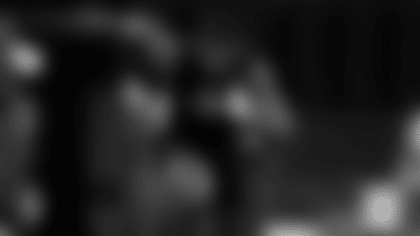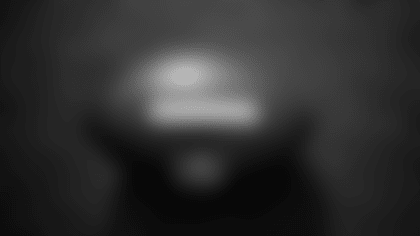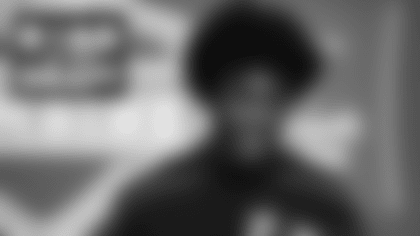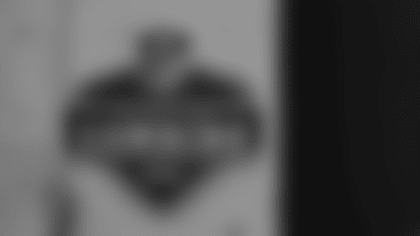General Manager Reggie McKenzie. Photo by Tony Gonzales
On how frustrating the season has been: "Going into this thing, from the offseason, I knew what role was in front in me and how we had to attack this thing. As we all know, it's been well-documented, mostly by you guys, about what I had in front of me, including players and coaches, what we all had in store. Now, with that being said, when Mark Davis and I began this quest and talked about the future of the Raiders, my ultimate goal was to build this team into a consistent playoff contender and Super Bowl winner. And we both agreed that we were going to build this thing the right way. Now going into this training camp, I liked the prospects, the way it was going. I knew what the talent level was, and I knew we didn't have depth, couldn't afford to lose players, not one. I knew there was going to be a dropoff, without a doubt. But, to be where we are now, at 3-8, disappointing. I don't want to be there. I know the fans aren't happy. I'm not happy, the coaches and I know the players aren't happy. This was a terrible November. This November, was a bad November. Now, you kind of knew in September, at the beginning of September, I knew there was going to be a little bit of a struggle, but in November, this part of the season, has not been good at all. That cannot continue to happen. It's our job to fix it, starting with me, player-wise, and the coaches trying to get situations fixed. You guys see it; big plays killed us on defense. It's hard to win when you're giving up big plays on defense. It's hard to win on defense that way. So, to answer your question, I was not looking at being at this point 3-8."
On what happened between Atlanta, when the team played a great game, to now: "If I could put my finger on it, I would fix it myself. But, when you look at the tape, how we attacked Atlanta, how we stopped the run, how we did not give up big runs, when you count the number of big plays in that game, you can start with that, how we played on defense. That's why we were in that game. But, since then, if you look game-by-game and see the big plays. Our D-line is not getting knocked off the ball. We're stout. When you talk about run defense, run game, the one thing you worry about is getting knocked around up front. And our guys are not. Bottom line is the gaps. That's fixable, but you can't let it happen. That's part of it right there, that and a big pass play, especially on third down when you think you can get off the field; too many of those since then, especially in November."
On the gaps being a coaching issue, or a disconnect with the players: "I've played. I know some of my responsibilities. A lot of that is on the players. Do your job. Just do your job. If you're going to attack, you shed off the block; you're responsible for this gap. It's been preached. This is your job, this is your gap. Most of it is that. Now, sometimes I'm sure certain plays, whether it's a slant or whether it's this, that's a call. Whether slanting or blitzing, maybe that takes him out, because he wasn't good enough to beat a guy across his face, or wasn't the right call at that time. For the most part, it's just being able to just do our job. So, you can live with that, because you can fix it. You can coach it up and say, 'Hey, you know what you did.' But the 'my bads' kind of get old after a while."
On how you go about fixing gap discipline, whether it's a bad habit of players having played under the previous staff: "Everybody's trying to make a play, so you try to be the guy going around the opposite way. I understand that, but the guy next to you, the guy behind you, everybody's got to be on the same page. You spoke of Warren Sapp, but I'm sure his teammates knew what he may do, so you've got to compensate for that. Is it innate? I couldn't tell you that. Some players get used to doing what they do, yeah. But hopefully, that's what my quest to change the culture of this thing, that part of it you can't change overnight, because you just can't change a guy. Some guys, you just can't change."
On his evaluation of the job Dennis Allen has done: "I'm still pleased with Dennis. I'm a rookie in this thing; Dennis is a rookie in this thing. He has some rookie mistakes, but overall, I'm happy with Dennis."
On whether Dennis is safe for next season, no matter what happens the rest of 2012: "Hey guys, players, coaches, my scouts, equipment guys, I'm not going to get after, from the standpoint of who's safe, who's in or out, I don't like to discuss anything during the season. Because it's my job to evaluate this team, and that's done on a weekly basis, so at the end of this thing, I have my evaluation of not only Coach Allen, but every player and my thoughts of every coach. That's a season evaluation. That's how I feel about that."
On where he sees the process of getting the Raiders back on track: "It was my No. 1 job really, to give what I feel is the backbone of a football team, to gather together my scouting department. I think I'm further along in that area than anything else."
On whether he feels he's closer to having a competitive roster than when he arrived: "When I got here? Well, when I got here, we were millions and millions of dollars over the cap. I was trying to figure out how to make decisions from a cap standpoint. When that played such a role in your decision-making, some players, you'd like to keep if you had the money. But in the beginning, my statement was here's what you dealt with. Mark told me, 'Here's what we've got. Here's what we're going to have to deal with in this first year. Here's the draft picks. Here's the money.' Totally understand that. Now, it's my job to figure out how you're going to manipulate it. So, am I further along? Yes. Under the cap, we trimmed the guys we had to. But guys, this thing is going forward. We're going to get better from here on out, especially in the player personnel department. So, that's my quest. We get on that, really on a weekly basis."
On communication regarding the Rolando McClain situation: "I step in from Point 1. Dennis and I talk on a daily basis numerous times. And I talk to Mark on an every-other-day basis, all the time. So, we communicate well and we're all on the same page. Everything that came out of (Allen's) mouth, I could've repeated it also. Coach Allen is the guy that is going to have to be in front of that team. I want him to be in charge of players."
On whether Allen will evaluate the assistant coaches after the year, or McKenzie: "He's going to have the evaluation, absolutely. Now, am I going to have evaluation also? Absolutely."
On whether Allen will have total control of coaching staff hirings: "With my input. You're talking about scheme and all that. Everyone's going to show up with his long list and all that, but this is way it goes, guys: This is my football team. Now, it's not a dictatorship by any means. But it's my football team, and I'm responsible. We have a great line of communication, so that's not going to be an issue, at all. It's my job to evaluate the situation, and I'm going to get that done. We're going to do it the right way. I can't build a team without effectively evaluating what's going on. You've got to do it the right way, week to week. That's why the month of November, we've got five weeks to correct that now. I'll be doing some evaluations in these five weeks."
On whether he regrets allowing the offensive scheme to be changed: "Well, you talk about leaving the offense be, you'd also be talking about leaving all the coaches be. You're saying that's going to guarantee the same results. We don't know that. Now, whether it's power scheme, zone scheme, to me it's all about knocking people off the ball, winning battles up front. I don't care what kind of scheme it is. Either it's a good run call, or a bad run call. It's comes down to those types of things, instead of just scheme. You've got to mix it up, which we've been doing, especially as of late. Players have to win some battles, too, physically."
On Mark Davis' level of frustration: "Like I said at the beginning, Mark and I talk all the time. The bottom line is we want to see progress, and that November month, nobody was pleased with. Nobody. He and I discussed that quite a bit, trying to put a finger on it, but we want to see better play, and we've got five games to do it."
On whether the Raiders are in the position to make offseason decisions they need to make, cap-wise: "Some, yeah. We should be in a good-enough situation to do some things. To do a lot of great things? We don't have a lot of room to do great things. But guys, what happened this offseason (2012), I don't wish that on anybody, other than maybe the other teams in our division. That was a struggle, especially coming in here as a rookie GM. I remember talking to (Green Bay general manager) Ted Thompson, his rookie year, we were able to get Charles Woodson. I would've like to have done that! I talk to guys all around the league and I didn't realize what the situation, how difficult, what other people thought about it. I get the job and all these people called and said, 'What are you going to do about the cap?' We get it done, because you've got to. But, they didn't wish that on me. But guys, that's crying over spilled milk. That's no excuse for what happened in November. The way we played in Atlanta, it shows what the players can do, without a doubt. So, from a consistency thing. Finishing drives. Defensively, we were probably more disappointed because of the number of big plays, time and time again. After you stuff them, have a good play or a great play, then all of a sudden, wham, seven points. Easy. Kind of knocks the wind out of you. A team like this, we're not to the level where we can continue to overcome that time and time again."
On the lack of pass rush: "Two things: I want to win up front, and that's on both sides of the ball, the big boys; but I also want to somehow affect the quarterback position. That's with good coverage, good corners, a free safety that's going to pick him off, or with somebody hitting him in pass rush, a good push up the middle, somebody that's he's going to be scared of. We're going to get that. Guys, we're going to try to upgrade a lot of positions, depth-wise, and get some impact players. That's going to be on me."
On an emphasis on getting players that love football, as opposed to people that just tolerate their job, and whether he thinks he has 53 players like that: "I hope that the guys come to that. I can't say that everybody is totally like that, no. I really don't think there's an NFL team like that. The bottom line is you have to have the majority of them like that, and you got your leadership, players that are strong that way, so when you've got some that deviate, then you've got a leader that can check them, show them the right way, 'This is how we do it here.' When you look at a Ray Lewis, you can pretty much bet, whether it's a defensive player who's not totally into it the way he is, I doubt if he shows it much. You know what I'm saying? Your surroundings. That's part of the whole culture thing, as far as, do you have to have a coach saying, 'Don't do that; do this.' You don't want that. You want the players to take it upon themselves and run it. We're not at that level."
On whether he was surprised at the lack of that this year: "You scout guys from other teams. You hear about stuff. So, I knew some of those players we had in those leadership positions. But I've also been around the LeRoy Butlers, the Reggie Whites, Brett Favres, Aaron Rodgers, you talk about natural leaders, doing it that way, no, I can't say I have that. Knowing that coming in, no one came to me to tell me, 'You have a great leader in him.' So, to answer that question, no. Going in, I didn't have a bunch of great leaders."
On whether leadership has emerged during the season: "I've seen some guys with leadership qualities. Sometimes when you've got a guy who we suspended (Rolando McClain), calling plays at the beginning, all during the offseason, then it's hard for others to emerge that way. But you've got new players, a guy you trade for in mid-season last year, trying to be an offensive leader. The dynamics…you've got to build the thing right."
On the big-picture with McClain: "From a leadership standpoint, you cannot do what he did and call yourself a leader. Period. Now, what to do with him, afterward, post-suspension, we'll let that play out. I don't want to make an announcement at this time. It's not good to act and do what he did."
On McClain during the games: "That's another thing, from an evaluation standpoint, players and coaches, I really want to talk about that at season's end. We still pretty much got a third of the season to play. I'm looking forward to seeing Omar Gaither in there, seeing how he runs this team, and plays in the middle. I've had 11 games to evaluate Rolando up close, so we'll finish that up at the end."
On Philip Wheeler as someone he's targeting for a long-term contract: "Without getting into who, and which players, all that, yes, we are targeting players. That's part of my deal, to target, see how we can work it. Yes, we are targeting certain guys. We've got quite a few free agents. We're going to see what targets we can get done before the league year, and even before the season. Yes, we are targeting guys."
On Michael Huff's long-term position: "He's a safety. I didn't have a lot of corners to begin with. At the start of the season, we had one guy, two guys that were here last year. Michael Huff just gave us the ability, because of his skill-level athleticism, he was our best option to do that with."
On whether he cares if Terrelle Pryor plays this season: "Oh, I care. That's the only way I can evaluate him, is to play him. When he plays, how he plays, that'll be a charge to the coaching staff. Yes, we need to. Like I said, we've got a third of the season left, and this is a good time to try to figure out what works best for him."
On what would be a successful season for the Raiders, in his eyes: "I want us to not only play well in the last five games, but in terms of progress, you talk about defense, I don't want to give up big runs. That means our gap control, down to a minimum as far as making mistakes. A guy breaking tackles, maybe their guy is better than our guy, and I'm fine with that. But to give them stuff? We're not good enough to just give guys stuff, points, or just giving up big plays like that. I'm just looking for the offense to move the ball, score some points, get better in the red zone, get better on third down, keep the chains moving, score points. More consistent special-teams play, especially in coverage. I'm looking for a lot of things, but I'm looking for some wins."
On whether being 3-8 brings out those players that really want to play: "Those that really want to play, who wants to be a Raider? Who wants to play Raider football? I'm talking each and every one of us. Coaches and players."
On whether that's a tall order, demanding the team play well, based on the last four games: "No, it really isn't. It really isn't. Some of the guys, physically, they're beat up. Might be pushing it, talking about playing well, they're fighting through some injuries. But, no; it's not a tall order."
On consistency: "I don't know. When a guy sees, 'Okay, I played this defense that way, and this is what happened,' can I guarantee that player would say that for 16 weeks? It's hard to say yes. I know I don't have a handle on what or how Miles Burris is going to play; he's 100 miles an hour, and sometimes it may be the wrong way. Saying, how is Rolando going to fit this run? I can't guarantee he's going to fit it up right all the time. It's hard to see who's going to do it the right way all time. Guys, it's the coaches' job to continue to point it out and make them do it the right way. Now, I wish I had a whole lot of depth to kind of rotate, and figure who can do it better, but when you're limited from the standpoint of injuries, the rotation gets thinner. It's coaches' job to coach them, and players' job to do what they're coached. It really is."
On whether he's been resistant to sign occasional big-name free agents: "The philosophy is to upgrade your roster. Did I think some of those guys would upgrade us on the field? I research everything. As soon as, before any of those names hit the fan, I've researched it. And I make a decision. You look at the tape. Scouts, we'll look at them, but also you've got to research everything. You make the decision. We made the call. That's my call."
On whether McClain has played his last game: "It's going to be a possibility. He's suspended. There's always, what's going to happen afterward? What's his approach afterward? I know what he's texting, Facebooked, all that, what he said, that he's gone. But I think I'm the one that's going to make that call, not him."
On whether he's had conversations with him: "No."
On whether he needs to have a talk with him: "Absolutely not."
On whether McClain has to say or demonstrate anything before he comes back: "That's the thing. It's going to be on him. I don't feel the need to approach him. So far, what you guys have written, from the information you got from him, it's not apologetic."
On whether the offense was one action or a series of actions: "I think a two-game suspension pretty much says, it's a issue."
On waiving Pat Lee: "Pat Lee from the standpoint of understanding the defense, he could come in there and you'd get your bad games on defense, but from a need standpoint, what really needed from a totality standpoint, special-teams play, with Ron (Bartell) coming back, we felt like we had our season-opening starter coming back, those two kind of canceled out to me. Now, I wish Pat Lee was more dominant, and helped us out more on special teams, but to his credit, he was kind of beat up physically, too. It was kind of hindering him some; it wasn't his fault. That was mainly the reason."


























